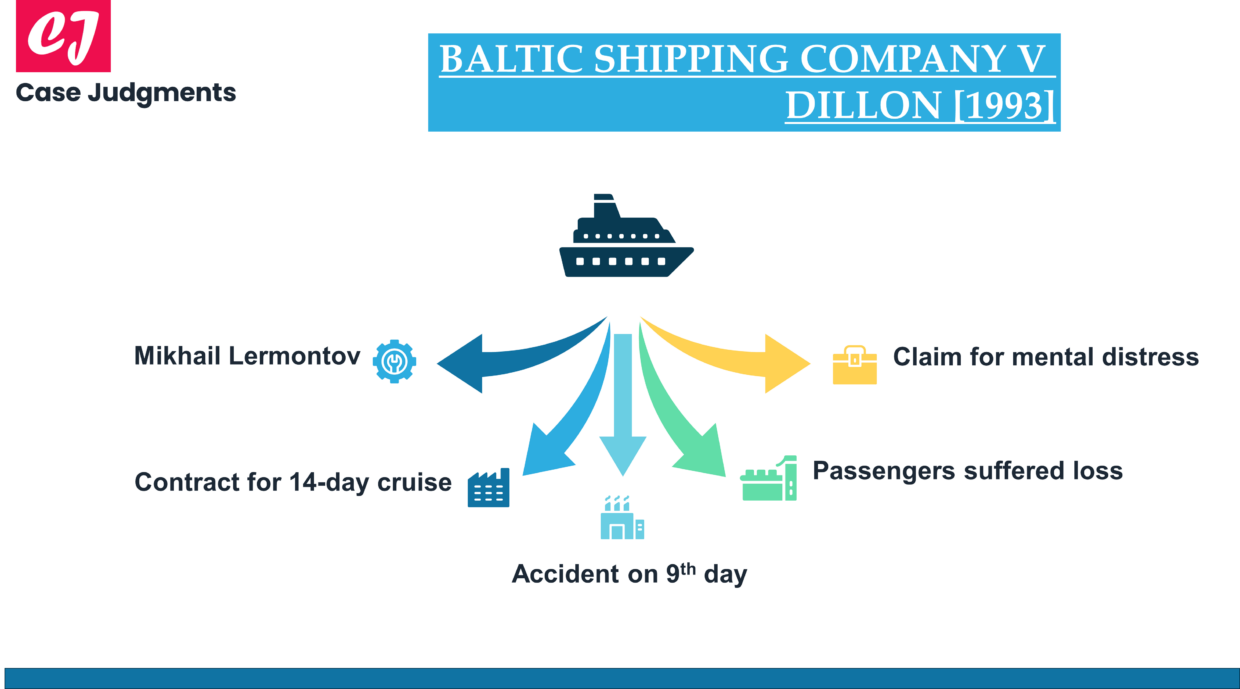
Baltic Shipping Co v Dillon: A Quick Summary
Baltic Shipping Co v Dillon is an Australian contract law case that deals with a dramatic example of a tragically truncated holiday. The question arose as to whether damages can be awarded for mental distress or not.
Given below are the details:
| Case name & citation: Baltic Shipping Company v Dillon [1993] HCA 4; (1993) 176 CLR 344 |
| The concerned Court: High Court of Australia |
| Decided on: 10 February 1993 |
| The bench of judges: Mason CJ, Brennan, Deane, Dawson, Toohey, Gaudron and McHugh JJ |
| Area of law: Damages for breach of contract |
Facts of the case (Baltic Shipping Co v Dillon)
In this case, Mrs. Dillon was the plaintiff and the defendant, Baltic Shipping, was the other party involved. Mrs. Dillon entered into a contract to take a 14-day cruise aboard the defendant’s vessel named “Mikhail Lermontov”. The cruise was intended to be a round-trip journey starting and ending in Sydney via the South Pacific Ocean. The agreed fare for this cruise was $2205, and the scheduled departure date was set for 7 February 1986.
As is customary for such cruises, Mrs. Dillon, the plaintiff, made the payment for the fare well ahead of the scheduled holiday. The contract between the parties was subject to the laws of New South Wales.
The ship departed from Sydney on the appointed day and proceeded smoothly until the ninth day of the journey when an unfortunate incident occurred. The ship struck a rock and subsequently sank off the coast of New Zealand. Owing to the collision, Mrs. Dillon, along with other passengers, suffered significant losses. Not only did she suffer personal injuries and property damage but mental distress as well. Baltic Shipping admitted that the collision was caused by their breach of the cruise contract, in particular, the breach of an implied term that reasonable care would be exercised by the shipowner in the navigation of the vessel.
During the trial, Mrs. Dillon was granted a sum of $1,417 as restitution of fare and $5,000 as compensation for the distress and disappointment she experienced due to the loss of entertainment (this was in addition to damages for personal injuries). The NSW Court of Appeal upheld the decision made by the trial judge, and subsequently, the case was brought before the High Court for further consideration.
Issue
The following issues were for consideration before the High Court:
1. Whether the plaintiff had the right to receive a refund of the prepaid fare due to a total failure of consideration?
2. Whether the plaintiff was eligible for general damages to compensate for the profound disappointment resulting from her tragically truncated holiday (the injured feelings issue)?
Judgment of the Court in Baltic Shipping Co v Dillon
The High Court ruled that to award the plaintiff restitution of the cruise fare alongside damages for disappointed feelings would lead to an excessive level of compensation. It emphasized that the damages awarded for disappointment were notably generous, amounting to twice the value of the cruise fare. (It might be noted that Mrs. Dillon had also been granted damages for personal injuries.)
In view of this, the restitution order was reversed by the High Court based on the grounds that, as there had been partial performance of the cruise until the ninth day, a total failure of consideration did not occur. But it upheld the damages that had been awarded for the plaintiff’s emotional distress and disappointment. They were not reduced despite being a little over-generous.
The reasoning behind the decision
In its reasoning, the Court held that there were three categories where damages could be awarded for injured feelings:
“1. Distress caused by a breach of a contract the object, or an object, of which is to provide enjoyment, pleasure, or relaxation.
2. Distress caused by a breach of a contract to prevent molestation or vexation.
3. Distress consequent upon physical injury or inconvenience caused by a breach.”
List of references:
- https://core.ac.uk/download/pdf/61296816.pdf
- http://classic.austlii.edu.au/au/journals/UQLawJl/1994/9.pdf
You might also like:
More from contract law:

